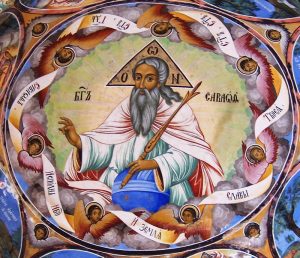Revised Common Lectionary Reflection, Fourth Sunday of Advent, Year A
December 22, 2019
Lessons: Isaiah 7:10-16; Psalm 80:1-7, 17-19; Romans 1:1-7; Matthew 1:18-25
Theme: God’s faithful and generous people do not lose heart but rather look to God for salvation and direction in the inbreaking kin-dom.
Key Scripture: Restore us, O LORD God of hosts; let your face shine, that we may be saved. Psalm 80:19
 I was riding with an Upper Midwest colleague from one small prairie town to another when we encountered a sharp curve in the road. “Wow, that’s some more curve!” I said. “Out here we call them course corrections,” he replied. Course corrections: What a great image, I thought. In that land where roads usually follow the lines of original square-acred homesteads, a curve in the road is an anomaly, something to be noted, even a landmark or sorts. How often do we chart our life’s course in ordered lines with discernable boundaries? And yet, course corrections happen in the midst of our best-laid plans.
I was riding with an Upper Midwest colleague from one small prairie town to another when we encountered a sharp curve in the road. “Wow, that’s some more curve!” I said. “Out here we call them course corrections,” he replied. Course corrections: What a great image, I thought. In that land where roads usually follow the lines of original square-acred homesteads, a curve in the road is an anomaly, something to be noted, even a landmark or sorts. How often do we chart our life’s course in ordered lines with discernable boundaries? And yet, course corrections happen in the midst of our best-laid plans.
Have you ever had your life’s grand plan altered in a significant way? Perhaps you’ve found yourself making a surprising vocational move or adjustment. Maybe you’ve been diagnosed with a chronic illness that has created for you a new “normal.” Have you experienced a devastating loss that turned all that you knew (and perhaps took for granted) on its head? Or, maybe you’re just frustrated with all that’s left to do in these waning days of Advent.
Consider Joseph’s story in this week’s gospel lesson. An angel of God visits Joseph in a dream, and that vision changes the entire trajectory of not only his life, but that of his family. We’re still feeling the effects of that course correction today. Think about it. Joseph had planned to make the best of a difficult situation, saving face for Mary by addressing this strange new development (her pregnancy) quietly and privately. In Joseph’s world, a woman would face scandal and perhaps even death for what would surely be viewed as an “indiscretion.” Instead, Joseph is looped into God’s plan that includes becoming a refugee and serving as parent to the fully divine and fully human Son of God. This makes most of my life’s course corrections seem pretty mild by comparison.
This week’s lessons remind us that good things often follow times of stress, trouble, and complication, i.e. course corrections. We, like Joseph, can respond with openness and a willingness to embrace change and new directions as we follow Jesus, Emmanuel, God with us.
Here are a few possible springboards for each lesson:
Isaiah 7:10-16
God’s people know a thing or two about suffering, the consequences of corporate sin, and loss. Here the prophet shares with the wounded and broken people the sign of God’s deep love and desire to be in relationship with us. King Ahaz still doesn’t get it and courts the kings of Assyria and Egypt—not the brightest move. And he does so under the pretense of “not putting the LORD to the test.” Could it be that Ahaz, like so many folks today, rely on human wisdom, scheming, and answers rather than on divine providence and promise? What lesson might we learn today from this ancient story?
 Psalm 80:1-7, 17-19
Psalm 80:1-7, 17-19
“Restore us, O LORD God of hosts; let your face shine, that we may be saved” (v. 19). Again, this song/poem from the Hebrew songbook reflects the misery of God’s people in both the northern and southern kingdoms. There is lament aplenty, which may seem counter-intuitive for the quickly approaching celebration of Christmas. Not everyone, however, finds joy and delight in this season. It can be a time of pain, grief, and woundedness. It’s tough to feel like a “Scrooge” without appropriate festal responses that the rest of the world seems to expect. This psalm provides space to lament—“You have fed them with the bread of tears, and given them tears to drink in full measure” (v. 5)—as well as a plea for restoration. The answer to the people’s misery is found in God’s promises and saving grace, particularly in the light of Christ that illumines even the most desolate corners of human existence. The answer hasn’t changed either, and it is perfectly fine to contend with God and issue the simple prayer “HELP!”
Romans 1:1-7
Look! God is doing a new thing and fulfilling prophecy in the process! Paul opens his letter to the church in Rome with this greeting (sorry, Paul, for the paraphrase), laying out his role and mission. This Son of God is for both Jews and Gentiles—for all people. Even today, some preachers echo Paul’s words (“Grace to you and peace from God of Father and the Lord Jesus Christ.”) before preaching the good news to contemporary congregants.
Matthew 1:18-25
Don’t let this snippet of gospel simply stand as a retelling of part of the Christmas story. This is a much more going on here—radical and good doings on the part of God. Prophecy is being fulfilled and radical hope is being formed in a young woman’s womb. Again, God is doing a new thing by showing up with us in flesh and bone, vulnerability and promise. What can we take from this story? Perhaps a willingness, like Joseph and Mary, to let the course of our lives be corrected and shaped in God’s design. The longing and anticipation for all the good things of Christmas is just the beginning. This radical good news of the incarnation of Emmanuel—“God is with us”—invites us to recalibrate our lives, allow for a course correction, and live more fully into the will of God and the good news of the Christ. What do you need for a course correction? A willingness to be vulnerable, a recognition that there’s an alternative way that leads to real and lasting live, and an awakening to our neighbors around us, all of whom who bear the image and imprint of the Creator. What new thing(s) is God up to in your particular context and community?
In Worship
Consider weaving themes from this week’s psalm into worship in a more meaningful and provoking way. How might your community hear verse 19: “Restore us, O LORD God of hosts; let your face shine, that we may be saved.”? What sort of restoration are your folks longing for? How do they hear verse 19?
You might also want to celebrate ministries of the men in your congregation on this day. What about inviting a male congregant to discuss how God has provided a “course correction” in his life? What about giving thanks for the faithful men who worship, serve, and walk daily as disciples? What about offering a special blessing and charge to the men of the congregation?
With Youth
Ask your youth to ponder the disobedient obedience that Joseph so radically embraces in this week’s gospel. Law and cultural practice would dictate a divorce, at the minimum, or a stoning for Mary. Joseph chooses to disobey civic, cultural, and religious law and practice to follow the instructions from God’s angels. His was a “disobedient obedience.” Ask youth if they can think of modern-day examples of disobedient obedience. Some examples might include Eric Liddell, Rosa Parks, or Dietrich Bonhoeffer. For more ideas, check out this article.
What cause might be worth disobedient obedience? When might following God put one at odds with following law? How does one weigh the cost? What might Joseph’s story teach us?
With Children
This week’s focus verse is Psalm 80:19 – Restore us, O LORD God of hosts; let your face shine, that we may be saved.
Three times in today’s psalm we hear these words. The people were pleading for God to change the way life was going for them. They needed saving. So these words are like a prayer—asking God to come and save them. As prayers go, it’s a pretty good one. They ask to be restored, they ask to experience God, and they ask to be saved. Maybe we could sum up this prayer in one word: HELP!
Remember, prayers don’t have to be long and fancy. They can be as simple as a word. God hears our prayers—and answers them. Plus, if we use fewer words, we have more space and time to listen to God. Today we also hear about someone who listened to God. I’m talking about Joseph. (If you have a nativity scene, bring Joseph to the children’s time.) Joseph listened to God, and it changed his life. In fact, because he listened and obeyed God, our lives are changed. I wonder if Joseph ever used the one word prayer, HELP!?
Finish with a prayer and a blessing for each child.
Weekly Stewardship Bulletin Insert
Part of being a good steward is being alert and aware of the Spirit’s movement in your life. How might you be called to make a course correction of your own for the sake of the gospel?
Stewardship at Home
This week at home, how about writing a note or two to men in your life who have been positive role models? Celebrate how Joseph stepped beyond traditional cultural and religious expectations, changing course as instructed by the Angel of God. If you have children at home talk with them about Joseph and his faithfulness and willingness to take risks as a follower of God. Clearly Joseph loved both God and Mary because he took on an unplanned role as Jesus’ human father, although not his birth father.
2016 Reflection: https://www.stewardshipoflife.org/2016/12/the-rest-of-your-story/
2013 Reflection: https://www.stewardshipoflife.org/2013/12/change-of-plans/
2010 Reflection: https://www.stewardshipoflife.org/2010/12/what-about-joseph/
Images: jerryw387; SOLI; and God of Hosts, Monastery of Saint John of Rila, from Art in the Christian Tradition, a project of the Vanderbilt Divinity Library, Nashville, TN. , Creative Commons usage license. Thanks!
Note: Reprint rights granted to congregations and other church organizations for local, nonprofit use. Just include this note: “Copyright (c) 2019, Rev. Sharron Blezard. Used by Permission.” Other uses, please inquire: thewritelife@hotmail.com.




Leave a Reply